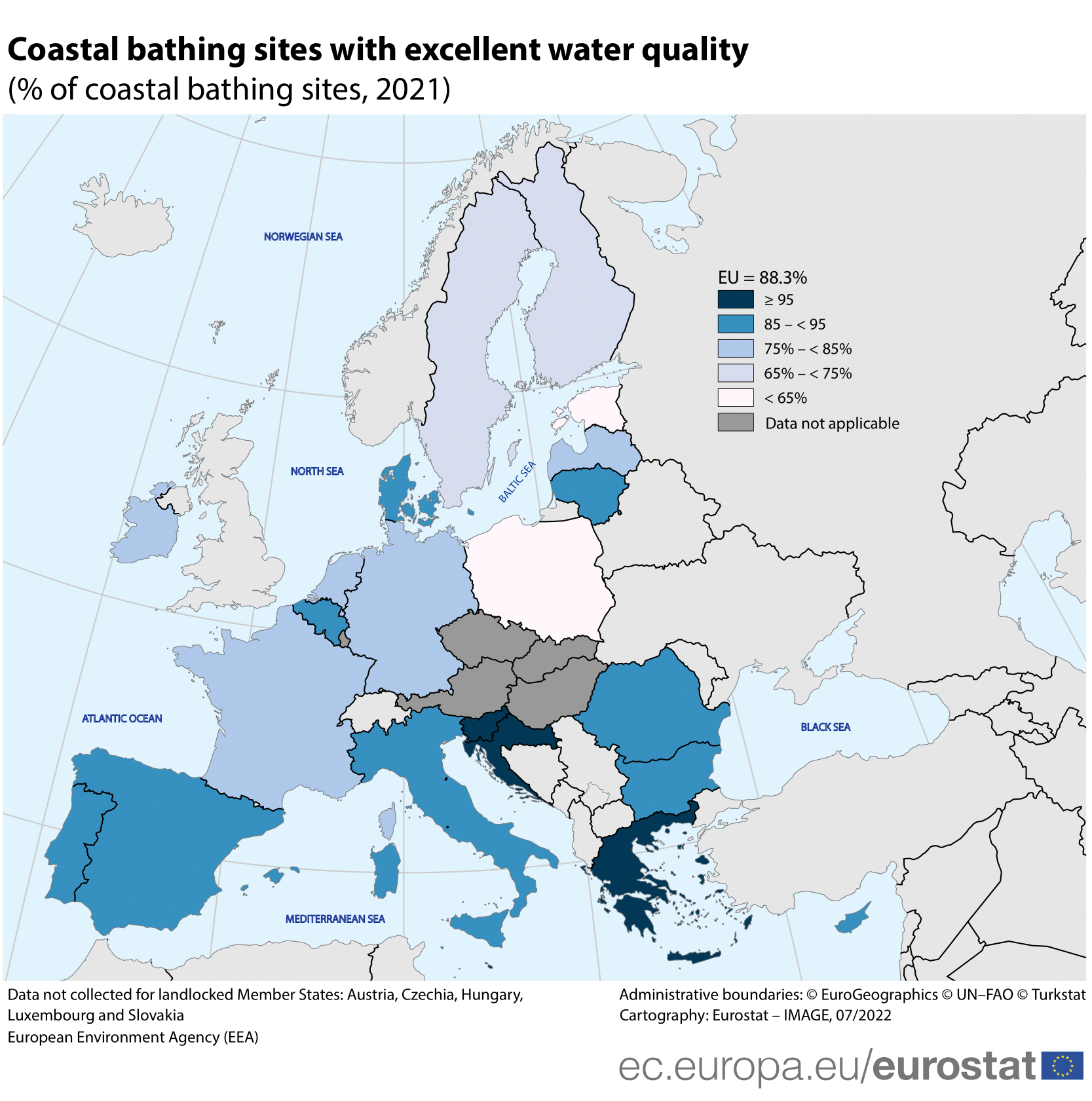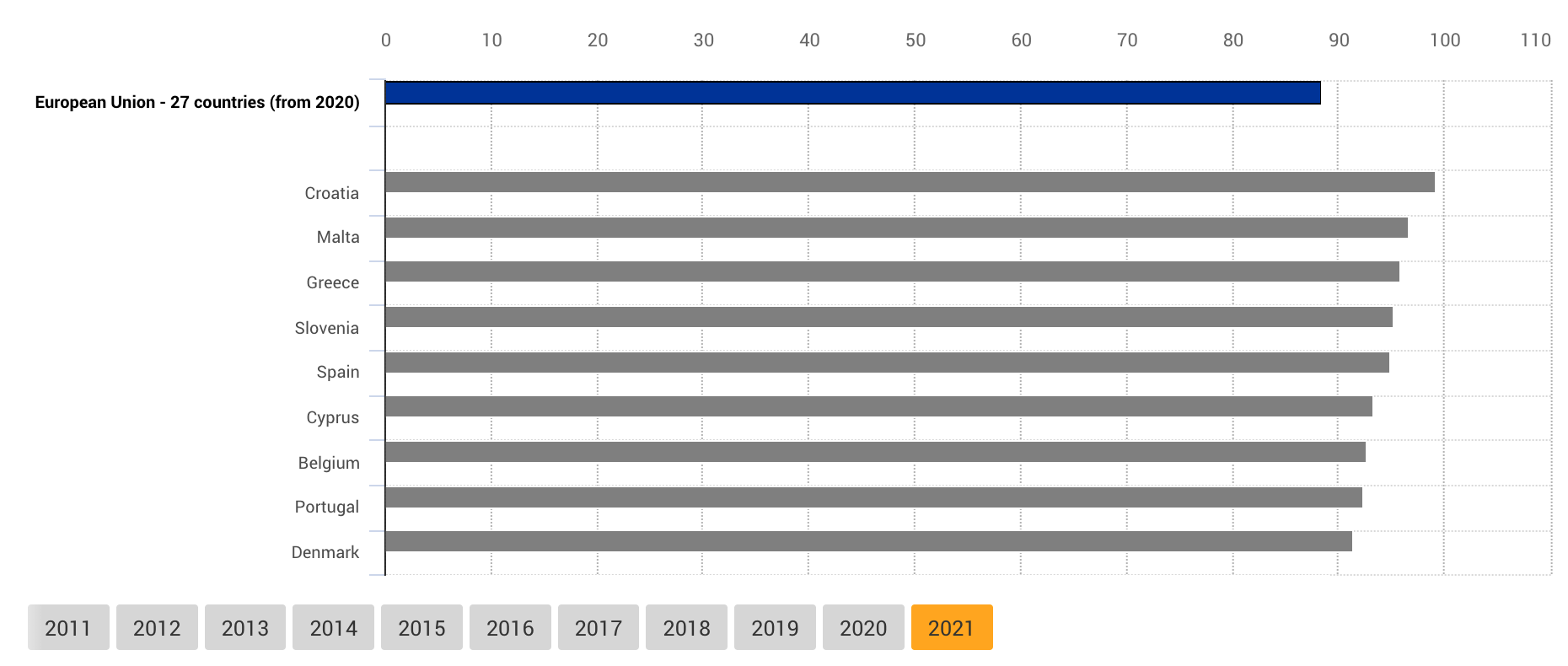Eurostat: Croatian Bathing Water Quality Best in Europe!
July 25, 2022 - We could not have asked for better news to arrive in the peak season as Eurostat reveals Croatian bathing water quality is the best in Europe based on EEA data from 2021!
Eurostat (European Statistical Office), the Directorate-General of the European Commission, released data on July 4, 2022, revealing the bathing sites with excellent water quality by locality in the European Union. The data was taken from the European Environment Agency (EEA).

"The indicator measures the number and proportion of coastal and inland bathing sites with excellent water quality. The indicator assessment is based on microbiological parameters (intestinal enterococci and Escherichia coli). The new Bathing Water Directive requires the Member States to identify and assess the quality of all inland and marine bathing waters and to classify these waters as ‘poor,’ ‘sufficient,’ ‘good,’ or ‘excellent,’" reads the Eurostat website.
Looking at 27 European Union countries, excluding the landlocked Czech Republic, Luxemburg, Hungary, Austria, and Slovakia, Croatia tops the list, recording bathing sites with an impressively high water quality of 99.2% in 2021.

In second place is Malta with 96.6%, Greece in third with 95.8%, and Slovenia in fourth with 95.2.
In 2020, Croatia lost out to Cyrpus, which recorded a perfect water quality score of 100%, though Croatia did come in second with 98.8%, followed by Greece with 97.1%. In the years prior, Croatia's bathing water quality was 98.4% in 2019, 95.6% in 2018, and 95.8% in 2017. Croatia's lowest water quality in the last decade was recorded in 2013 when it was 95.4%. And even that year, it finished 4th place!
It is interesting to note that Italy's bathing water quality has gotten worse in 2021 - recording 88.1% in 2021 and 88.7% in 2020. Italy is just under the overall EU average for bathing water quality, which is 88.3%.
You can find all the data on the bathing water quality in Europe on the Eurostat website.
For more, make sure to check out our dedicated lifestyle section.
Energy Institute Hrvoje Požar (EIHP) to be First Nearly Zero Energy Building in Croatia
June 21, 2021 - An exciting new step for Croatian energy efficiency is happening at the Energy Institute Hrvoje Požar (EIHP), as the Institute makes significant changes to its building which will also help to educate other experts for energy efficiency.
As the Energy Institute Hrvoje Požar (EIHP) gave great support and input in REPLACE Project that brings energy efficiency to Rijeka and Kvarner region, just put a new log in Croatian energetic efficiency. The start of June saw the contract for granting non-returnable funds for founding nZEB- the National Training Center on Nearly Zero Energy Buildings, EIHP reported on its website. The project is financed from the „Energy and Climate Change“ Fund, part of the Financial Mechanisms 2014 – 2021 in Croatia, courtesy of the European Economic Area (EEA).
1,600,000 Euros is the total value of this project on which EIHP collaborates with the Faculty of Civil Engineering, University of Zagreb. The goal is to empower all the actors in reconstructing buildings to meet the nZEB standard.
With the center being established in the building of the Požar Institute undergoing reconstruction at the moment, it will be a vivid example of the modern technologies that are implemented in nZEB design.
„We will show and share with the widest professional community the solutions that will be developed through this project. The whole process of reconstruction will be followed and documented, and detailed, and serve as an example in the training program as the Institute becomes the first public building in Croatia reconstructed in such a manner. With the appliance of green energy technologies (electrification of heating and cooling systems with a crane that uses shallow geothermal source, integrated photo charged electric plant on the roof, energy containers, efficient lighting), we also wish to include E-mobility, which is certainly the future of traffic as well as accomplish complete digitalization of all technical systems the building is using. That way, the building will be the showcase example of the double transition – green and digital“; said the EIHP headmaster, Dražen Jakšić.
Jakšić attended the signing of the contract, along with the regional development Minister Nataša Tramišak, Norwegian Ambassador Haakon Blankenburg (as Norway also supports the Financial Mechanisms 2014 – 2021), Ministry secretary of economy and sustainable growth dr. Mario šiljeg, and the Faculty of Civil Engineering dean dr. Stjepan Lakušić.
„After this pandemic, we will not develop by repeating the things from before. A historical change is afoot, and we will meet it with green development and with new 'Green Deal'“, concluded Jakšić while Minister Tramišak also pointed out that securing financial mechanisms for advanced technologies and energy renewal.
Learn more about Croatian inventions & discoveries: from Tesla to Rimac on our TC page.
For more about science in Croatia, follow TCN's dedicated page.
Croatia Among Countries with Cleanest Swimming Waters in Europe
June 9, 2020 - When planning your summer holiday after the corona crisis, cleanliness is certainly one of the factors topping the list. Good news for those of you choosing Croatia, which boasts some of the cleanest swimming waters in Europe.
Croatia is one of five European countries with the cleanest bathing waters, the European Environment Agency (EEA) announced on Monday, as borders begin to open after the corona crisis and tourists consider where to spend their summer holidays.
Namely, Dalmacija Danas reports that the cleanest swimming waters in Europe are in Cyprus, Austria, Malta, Greece and Croatia, according to a report by the European Commission and the EEA.
Those five countries received an excellent rating of at least 95 percent for their swimming areas. In Cyprus, 99.1 percent of bathing places received a rating of "excellent".
Tourists who fear being infected with the coronavirus while swimming should follow the guidelines of national or local authorities, the agency says. They should keep physical distances and wash their hands often enough.
Just under 85% of swimming sites across Europe monitored in 2019 met the European Union's highest and most stringent ‘excellent' quality standards. The agency tested bathing areas on about 22,300 sea, river and lake beaches in the EU, including Britain, Switzerland and Albania.
About two-thirds of the bathing areas are at sea and they are generally cleaner than the waters inland. Tests found that 294 sites, or 1.3 percent, have poor water quality and pose a risk for diseases such as diarrhea.
Commissioner in charge of the Environment, Fisheries and Oceans, Virginijus Sinkevičius, said, “Clean bathing water is usually taken as something that is gifted, but it's actually one of the European collective achievements. It's the result of hard work by many people over many years. This year's report once again confirms that European citizens can continue to enjoy very high-quality standards when bathing in European waters and all measures must be taken to continue along this path.”
To read more about lifestyle in Croatia, follow TCN's dedicated page.
Croatia's AD Plastik Contracts Job Worth 48.6 Million Euro for EU Market
While bleak and uninspiring stories about the state of the Croatian economy and doing business in Croatia continue to circulate across news and media portals as well as in newspapers, not everything is so bleak, you just need to look a little harder. Croatia's AD Plastik has contracted brand new jobs for the European Union market worth a massive 46.8 million euros.
As SEEbiz writes on the 16th of April, 2019, Croatia's AD Plastik d.d. has contracted the new jobs for the European Union for the PSA and FCA Group.
The job of the production of speaker carriers for the Citroen Picasso and C-Elysee PSA Group cars was contracted, which is worth 1.7 million euros, with the start of production scheduled for 2020 with a projected eight-year duration. With the very same buyer, the production of side panels for the Citroen C3 in the value of an additional three million euros, with the start of production planned in 2020, is also in the works, with a projected duration of four years.
New operations for the production of guardrails/handrails for several PSA Group vehicles (Peugeot 208, Peugeot 2008, Citroen DS3 Crossback and Opel Corsa) have been agreed with a total value of 20 million euros attached to them, with a projected ten-year duration, and the works begining during 2019. The Opel Adam Crossback is yet another vehicle from the aforementioned group, for which the engine manufacturing, costing 1.4 million euros, has been contracted with Croatia's AD Plastik, with the anticipated start of serial production being next year, and the duration of the project standing at seven years.
Croatia's AD Plastik d.d. also arranged and contracted 20.7 million euros' worth of new jobs for the FCA Group for the Jeep Compass and Fiat 500e cars. For the Fiat 500e, interior components and air intakes will be produced at AD Plastik's factories, and the total value of the project is 13.9 million euros. The project duration is projected at eight years and serial production is planned for 2020.
For the Jeep Compass, handgrip production contracted at 6.8 million euros has been agreed and the start of serial production is planned for next year with an estimated four year project duration.
Make sure to follow our dedicated business and Made in Croatia pages for much more on doing business in Croatia, products and services from Croatia, manufacturing in Croatia and much more.


